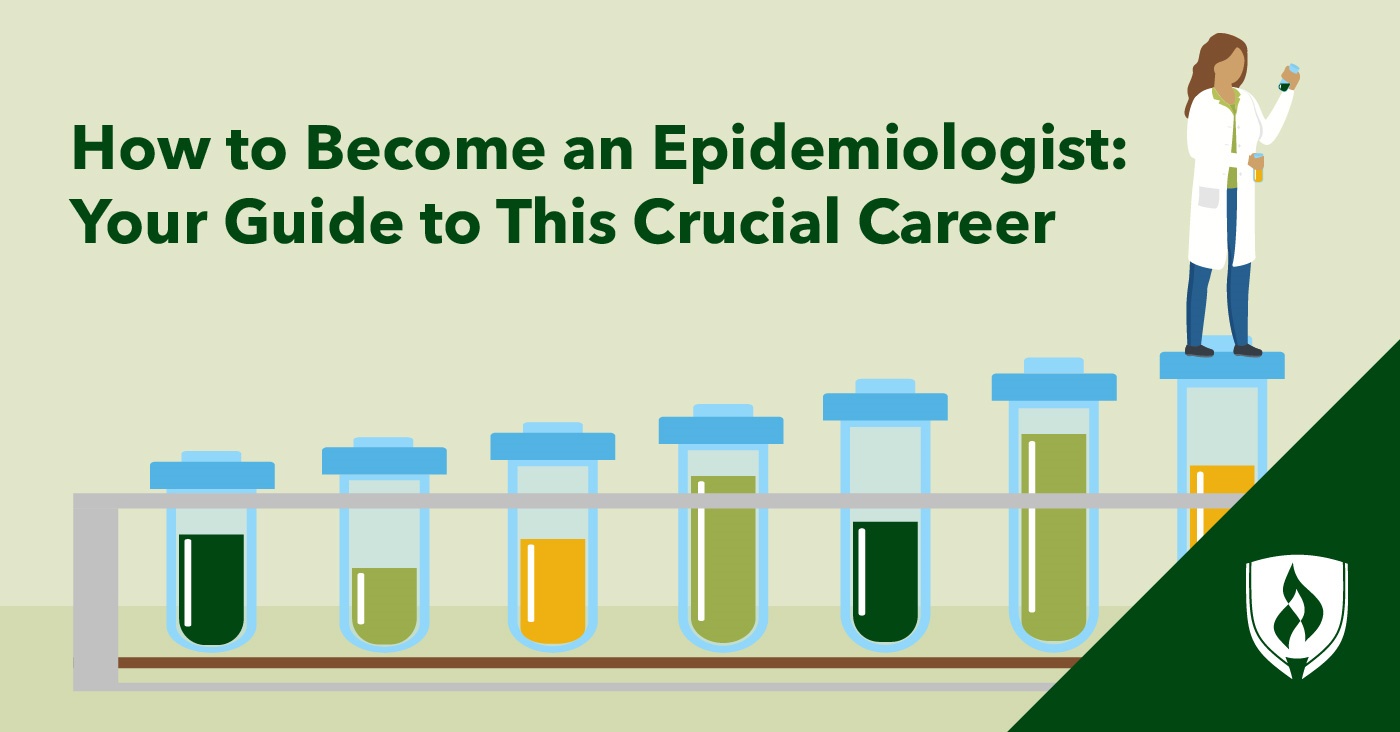The field of epidemiology has been around for quite some time. But with the COVID-19 pandemic causing shockwaves across the globe, the role of an epidemiologist has captured your attention. Epidemiologists are known as the “disease detectives” of the public health realm, but what does it take to actually work in one of these crucial big-picture healthcare roles?

You probably have a general idea of what it takes to work in public health—earn a degree, graduate, get work experience—but you want to know more about what it takes to work in this specialized field. Join us as we walk through the steps to become an epidemiologist.
How to become an epidemiologist
Epidemiologists are highly specialized public health professionals. Getting started in one of these positions can be a long process with multiple steps and several years of hard work along the way. Let’s take a look at how the path to this career may play out.
1. Earn a Bachelor’s degree
The first step toward working in epidemiology is earning a Bachelor’s degree. Undergraduate degree programs that focus solely on epidemiology are not common, so aspiring epidemiologists have some options for their undergraduate majors.
That said, you’ll want to think a few steps ahead when choosing an undergraduate area of study. Epidemiologists need to have a Master’s degree at the minimum, according to the U.S Bureau of Labor Statistics.1 This means undergraduate students interested in pursuing a career as an epidemiologist will want to take into account the admissions requirements of the graduate programs they are interested in. While the specific requirements will vary depending on the graduate program, it’s safe to assume you’ll need a transcript that clearly shows you can in succeed in science- and mathematics-based courses.
2. Gain work experience
No matter where you’re at in the process to become an epidemiologist, relevant work experience will be a plus. You’ll want to use any discretionary time you have to gain work experience in healthcare or public health roles.
Entry-level healthcare positions in hospitals or long-term care facilities can provide a boost to your resume for both grad school and your career overall. Working in a hospital or nursing home as a nursing assistant, medical scribe, EMT or medical assistant is an opportunity to make valuable connections with other healthcare professionals and learn more about the hands-on side of healthcare.
Epidemiology-related internships at local public health departments, community clinics or even abroad are another valuable way to bolster your resume. Depending on your academic path, these internships may also be an educational requirement.
Dr. Chanh Ho, MPH and head of the medical review team at Constant Delights, recommends applying for internship placements in low- or middle-income areas where infectious disease outbreaks happen more often as they can provide a practical look at epidemiology in action.
No matter where you build experience or take on an internship, Dr. Ho emphasizes the importance of building connections with public health and epidemiology professionals whenever possible.
“Build interdisciplinary networks, including senior epidemiologists, infectious disease physicians, nurses and public health practitioners,” says Dr. Ho.
3. Complete your graduate (or postgraduate) education
As we mentioned before, epidemiologists will need a graduate-level education. Like with undergrad, there are different graduate education options to consider. Though all of them can help you reach your goal of working in epidemiology, the differences between these options may give you a leg up for specific focus areas within epidemiology.
Master of Public Health: MPH programs give students a broad education of public health. Students study epidemiological research methods alongside health policy, environmental health sciences and social and behavioral science. Often epidemiology professionals with an MPH focus their work on the application of epidemiology research to public health issues.
Master of Science in Epidemiology: An MS in Epidemiology is less broad than the MPH. MS students are laser focused on the science of epidemiology and statistical research methods. Future epidemiologists who are strictly interested in doing research may find more success with this degree. They’ll study biostatics, research methodology and models of disease control.
Additionally, a postgraduate degree may be a desirable option for epidemiologists who’d like to work in academia or qualify for advanced research positions. Here’s a brief overview of a few options:
- PhD in Epidemiology: This is the most common doctoral degree for epidemiologists. It’s great for those who want to direct research projects or work as professors. Generally, a PhD program will focus on a specialized subject like environmental epidemiology, cancer epidemiology or infectious disease epidemiology.
- Doctor of Public Health in Epidemiology (DrPH): This academic option is less common but is often earned by those who wanted to advance in public health management or conduct highly specialized research.
- MD/MPH: Some medical schools offer “dual-degree” programs that allow students to earn a Master of Public Health as well as their MD. While many doctors with MPH degrees continue to work in clinical practice, others dive into epidemiology research. They also can work in global health or healthcare policy.
4. Consider pursuing professional certifications
Another great way to help your resume stand out is through earning relevant public health certifications. Though they are not often required, they can help you stand out from other candidates and round out your expertise. Epidemiology-related certifications you may want to consider include:
- National Board of Public Health Examiner’s Certified in Public Health
- Certification Board of Infection Control and Epidemiology’s Associate - Infection Prevention and Control (a-IPC)
- Certification in Infection Control (CIC)
5. Secure employment as an epidemiologist
Last, but obviously not least, is the job search. A large portion of epidemiology jobs are found in the public sector, so you’ll want to scour local, state and federal job boards for positions in public health departments. Research is another major employment driver for epidemiologists, so universities, pharmaceutical companies and other large medical institutions may present opportunities.
Keep in mind, this can be a competitive field with many positions depending on inconsistent public funding, so you may need to cast a wide net and be willing to relocate.
Ready to get started?
While it’s true becoming an epidemiologist take a substantial investment in education and effort, the field can be immensely rewarding. While a doctor may treat individual patients who’ve contracted an infectious disease, an epidemiologist may be able to help prevent thousands of people from ever contracting that disease and suffering—and that’s a noble cause.
If you’re interested in making that kind of impact and are ready to start researching your education options, visit the Rasmussen University Master of Public Health program page. Not sure if a Master of Public Health degree is right for you? Our article “What Can You Do With a Public Health Degree? Exploring Your Options” can help highlight some epidemiology-adjacent options available to public health professionals.
1Bureau of Labor Statistics, U.S. Department of Labor, Occupational Outlook Handbook, [accessed January, 2021] www.bls.gov/ooh/. Information represents national, averaged data for the occupations listed and includes workers at all levels of education and experience. This data does not represent starting salaries. Employment conditions in your area may vary.




